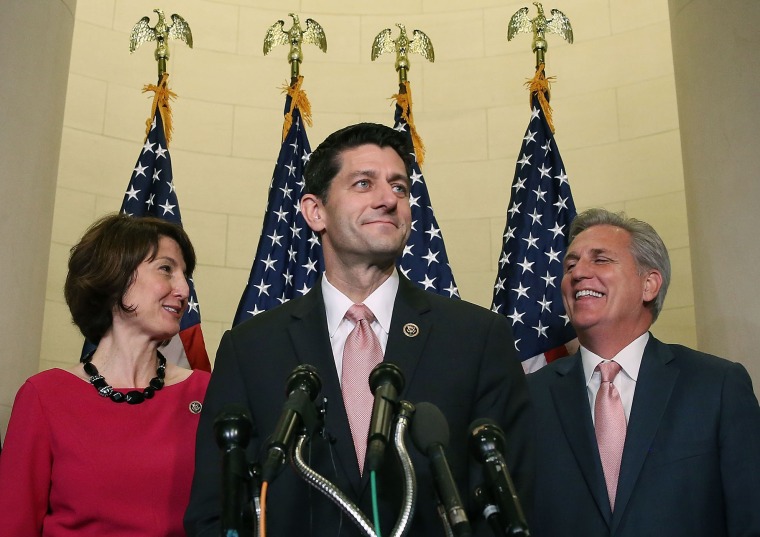Rep. Cathy McMorris Rodgers (R-Wash.), the chair of the House Republican Conference, has an op-ed in the Washington Post today defending her party's health care bill. Not surprisingly, it's an unpersuasive piece, but it included an interesting criticism of the status quo.The core of McMorris Rodgers' argument is that she wouldn't support a bill that hurts people with pre-existing conditions because she has a special-needs child. Her op-ed argues that the Republican protects the "most vulnerable" by "empowering states to innovate with new models for better patient outcomes."That's an interesting way of saying, "allowing people with pre-existing conditions to be charged vastly more for care," but House GOP leaders are going to do what House GOP leaders do.This, however, was the part that struck me as important:
With Obamacare, our health-insurance system relies on younger, healthier people subsidizing the costs of the older and sicker.
Well, yes, it does. It's something popularly known as "health insurance."Two months ago, House Speaker Paul Ryan (R-Wis.), as part of a slide-show presentation, complained to reporters, "The whole idea of Obamacare is ... the people who are healthy pay for the people who are sick."This is the same argument as McMorris Rodgers' complaint about the Affordable Care Act, and they're both mistaken -- not about the law, but about how insurance is supposed to work.Imagine if I complained about auto insurance by saying, "The problem with the system is that it relies on people who don't get into car accidents to subsidize the costs of those who do get into accidents." That would probably sound pretty silly, but it's effectively what the House Republican leadership keeps saying about health care.As we discussed in March, the whole idea of health insurance is to establish a system in which the people who are healthy pay for the people who are sick. You don't need to be an expert to understand the model: Americans pay premiums, the money goes into a pool, funds from that pool pay for care. It's Insurance 101.If the healthy don't subsidize the costs of the sick -- knowing that someday, someone who's healthy may not be -- that leaves only a few possibilities. The sick can try to pay for themselves; the government can pick up the tab; or the sick can go without care.Americans can have a spirited debate about the best approach, but the more House GOP leaders complain about the Affordable Care Act by saying it resembles health insurance, the more I'm concerned they're not fully prepared for the argument.Postscript: McMorris Rodgers' op-ed went on to argue that costs would drop for the healthy if people "who are sick or who have preexisting conditions" are removed from the system and put in high-risk pools. That's almost certainly true. But since high-risk pools have never worked, and since the legislation McMorris Rodgers voted for doesn't adequately fund such an endeavor, her approach would do real, lasting harm to millions of Americans who are currently protected by the Affordable Care Act that GOP lawmakers are desperate to destroy.
